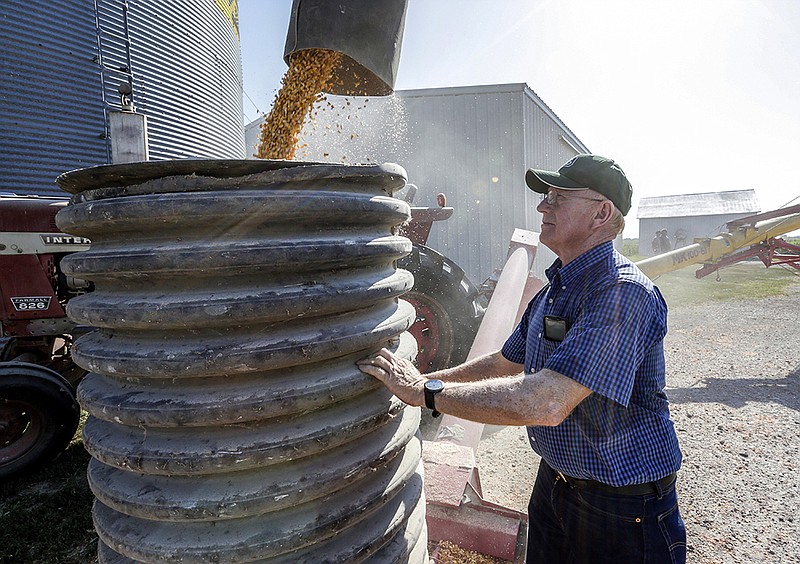It's clear that President Donald Trump is a city slicker, albeit one who is quite at home in "the swamp" of Washington, D.C.
He wouldn't know farming - let alone a farmer - if several hundred of them bit him on the you-know-what.
Despite his claims of being a successful businessman, he has no inkling of the business sense a farmer has to have.
Apparently Trump thinks of farmers only as people in overalls who scratch seeds into the dirt, and that's in spite of the maps that former Georgia farm boy, governor and veterinarian-turned-U.S. Agriculture Secretary Sonny Perdue has shown our president - maps depicting the nearly identical outlines of America's farmland and Trump country.
But the best result entreaties from Perdue and others could bring was the administration's announcement last week that it would provide up to $12 billion in emergency relief for farmers hurt by Trump's relished trade war - the one sure to grow gaping financial losses as the president plows ahead on his ill-advised foreign policy.
One can only imagine the bitter taste in Perdue's mouth as he announced what Tennessee Sen. Bob Corker has already labeled "offering welfare to farmers."
Yet Perdue planted Trump's seeds of protectionism anyway: "The actions today are a firm statement that other nations cannot bully our agricultural producers to force the United States to cave in," Perdue said during a call with national reporters. "This administration will not stand by while our hard-working agricultural producers bear the brunt of unfriendly and illegal tariffs."
Here's how it's working so far: Trump imposed tariffs to protect the U.S. economy from foreign products. The European Union, Canada, Mexico, China and other countries have responded to Trump's tariffs on steel, aluminum and $34 billion worth of Chinese products by imposing their own tit-for-tat taxes on us - often choosing farm goods like soybeans, pork, sugar, orange juice and cherries (but we call that "illegal.")
Now Trump's giving $12 billion to farmers hurt by tariffs and announced he will "begin" negotiations with the EU. So the tariffs Trump imposed over the objections of his advisers and economic experts - the ones Trump said will protect the American economy - have resulted in taxpayers subsidizing farms and paying more for our own food.
Nothing like making America great again, huh? If you're wondering what industries the stable genius will save next, here's a hint. He's again talking about a 25 percent auto tariff.
Former Tennessee Gov. Phil Bredesen, now a Democratic candidate for Corker's soon-to-be vacated U.S. Senate seat, says the tariffs - all of them - mean Tennessee businesses and farmers become less competitive in the world.
"Suddenly, it's more expensive to do business with Tennessee," Bredesen said last week in an op-ed piece on this page. "In the end, in the real world, that means one thing - a loss of jobs in Tennessee."
And Bredesen knows Trump's tweet assurances that eventually "all will be Great!" is just more bunk.
"This is not a short-term problem for Tennessee agriculture. China is not going to stop buying soybeans; it will just buy them from other countries such as Brazil. Once those patterns are established and Brazilian farmers invest in growing more soybeans, that business is not coming back to Tennessee - it's gone," Bredesen says.
Trump's farm aid plan also brought a howl from Republicans and trade groups, who view it as "an expensive and clunky solution to a crisis of Depression-era proportions," according to The New York Times.
"This trade war is cutting the legs out from under farmers, and the White House's 'plan' is to spend $12 billion on gold crutches," Sen. Ben Sasse, R-Neb., told the Times. "This administration's tariffs and bailouts aren't going to make America great again, they're just going to make it 1929 again."
Corker's full comment, made in a statement, were equally harsh, but didn't pin the blame solely on Trump. The former mayor of Chattanooga who has often been asked if he ever plans to run for president, also points to Vice President Mike Pence.
"I am glad that the administration finally seems to understand that the Trump-Pence tariffs are hurting the American people," said the chairman of the Senate Foreign Relations Committee. "These tariffs are a massive tax increase on American consumers and businesses, and instead of offering welfare to farmers to solve a problem they themselves created, the administration should reverse course and end this incoherent policy."
Corker says he will continue to push for a binding vote in Congress to reassert Congress' constitutional role on national security-designated tariffs.
Farmers don't want welfare. And our country can't afford it.
Besides, what are farmers supposed to do with this temporary handout? Buy seed and cattle to produce food for next year when the foreign markets have found newer, cheaper suppliers? And what happens when the mid-terms are long-past and the aid designed to protect not farmers, but Trump's majority Congress, is dried up?
After the elections, will the prevailing political winds call for states to impose a work-for-farm-welfare rule? Will conservatives call for watchdog regulations to ensure farmers don't spend their aid on movie theaters, liquor stores, casinos, or opioids? Guess we'd better get that drug-testing-for-farmers legislation ready.
Yes, this is all ludicrous. But so is the knee-jerk policy this president maps daily.
